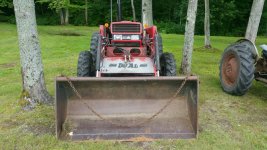Yep, no need to buy junk is the big thing. Used machinery doesn't have the value it once did. It's a buyer's market.
My old buddy (we're both about 70 now) looked at a well-used JD310 backhoe/loader 5 years ago. You know the kind: Big, Yellow, 10K+ hours, and in use at every construction site the world over. Parts are universally available for JD310s. The engines and trannys are mostly bulletproof, but it needed tires, new hoses everywhere, the cylinders leaked, and every joint of the loader and backhoe was worn and sloppy. But it worked. The point is that there was absolutely no market for that tractor. None. He paid 5 or 10 grand for it - I forget exactly how much - and probably could have gotten it for half of what he paid. Nobody else was even remotely interested.
Anyway, he drove it home 30 miles, stopping to put on new tires. Then came all new hoses, replaced the oil seals in the cylinders, and replaced the bushings on the loader and backhoe pivots himself over the next six months. New battery and some clean up. That was all done 5 years ago. Honestly it would be hard to say that a brand new tractor would operate all that differently from his old one. It's tight, works fine, and has been perfectly reliable. Total cost is about ten cents on the dollar compared to new.
BUT.... this approach works far better if messing with mechanical things is a hobby for you.
And if it is a hobby, you probably already know what we've been saying in this thread.
rScotty




